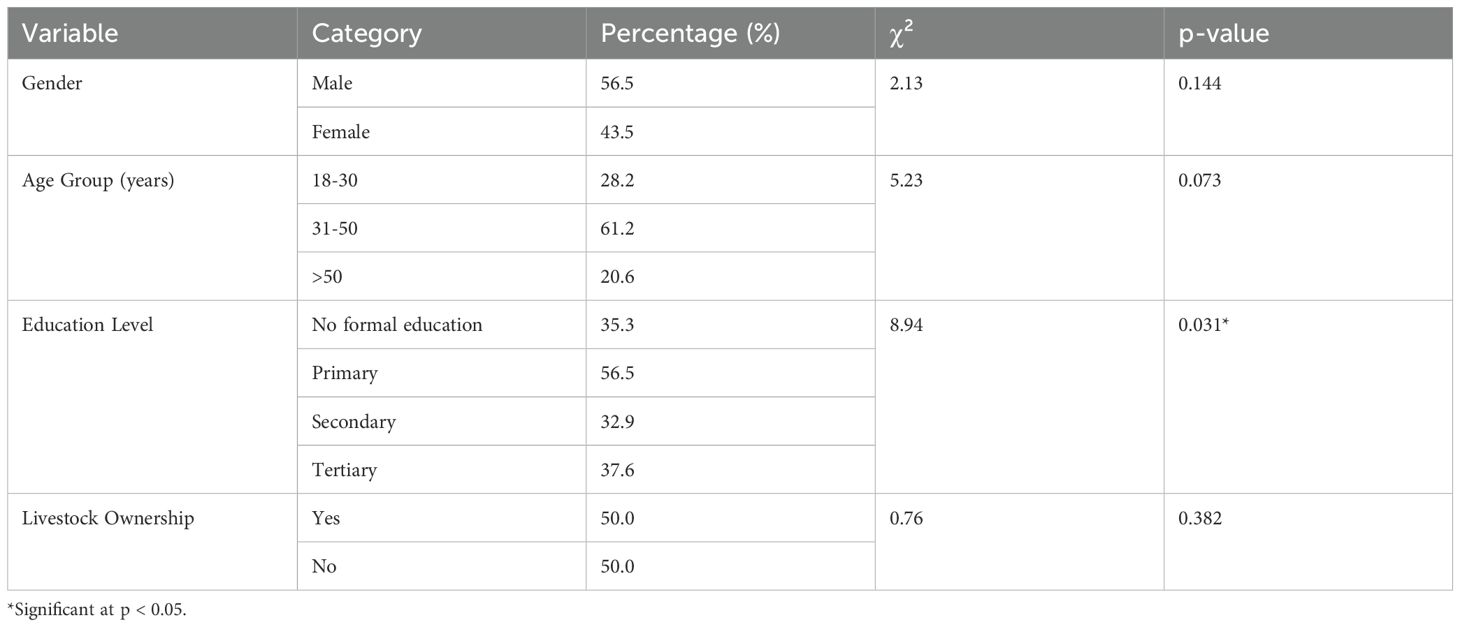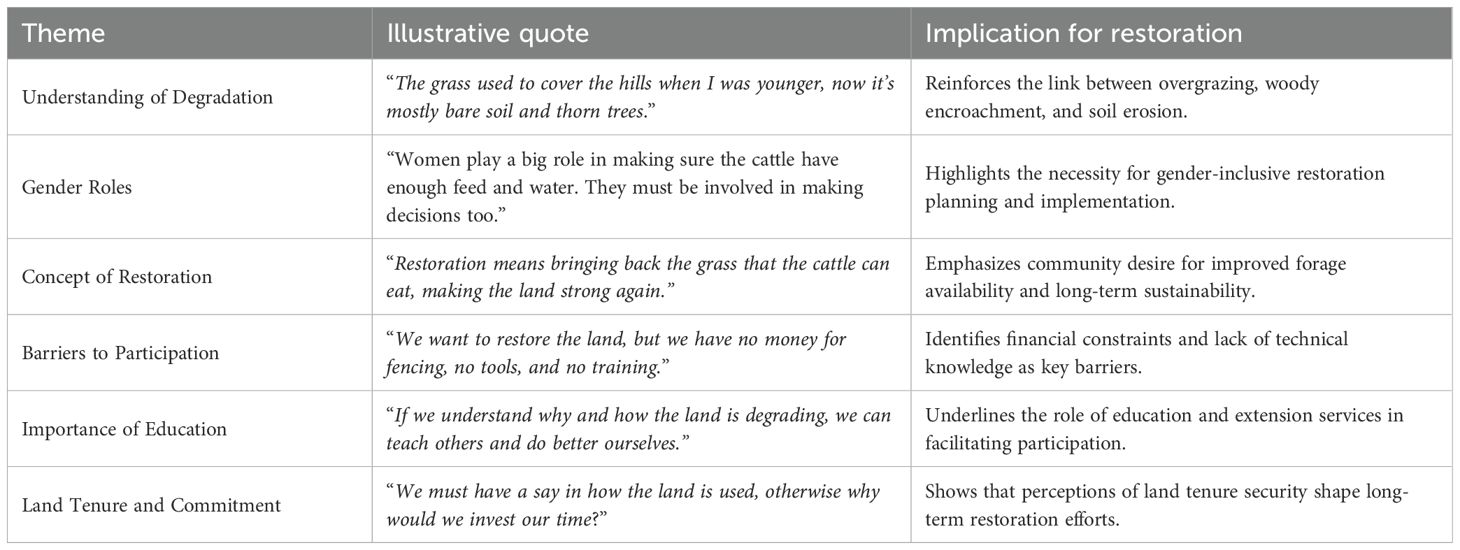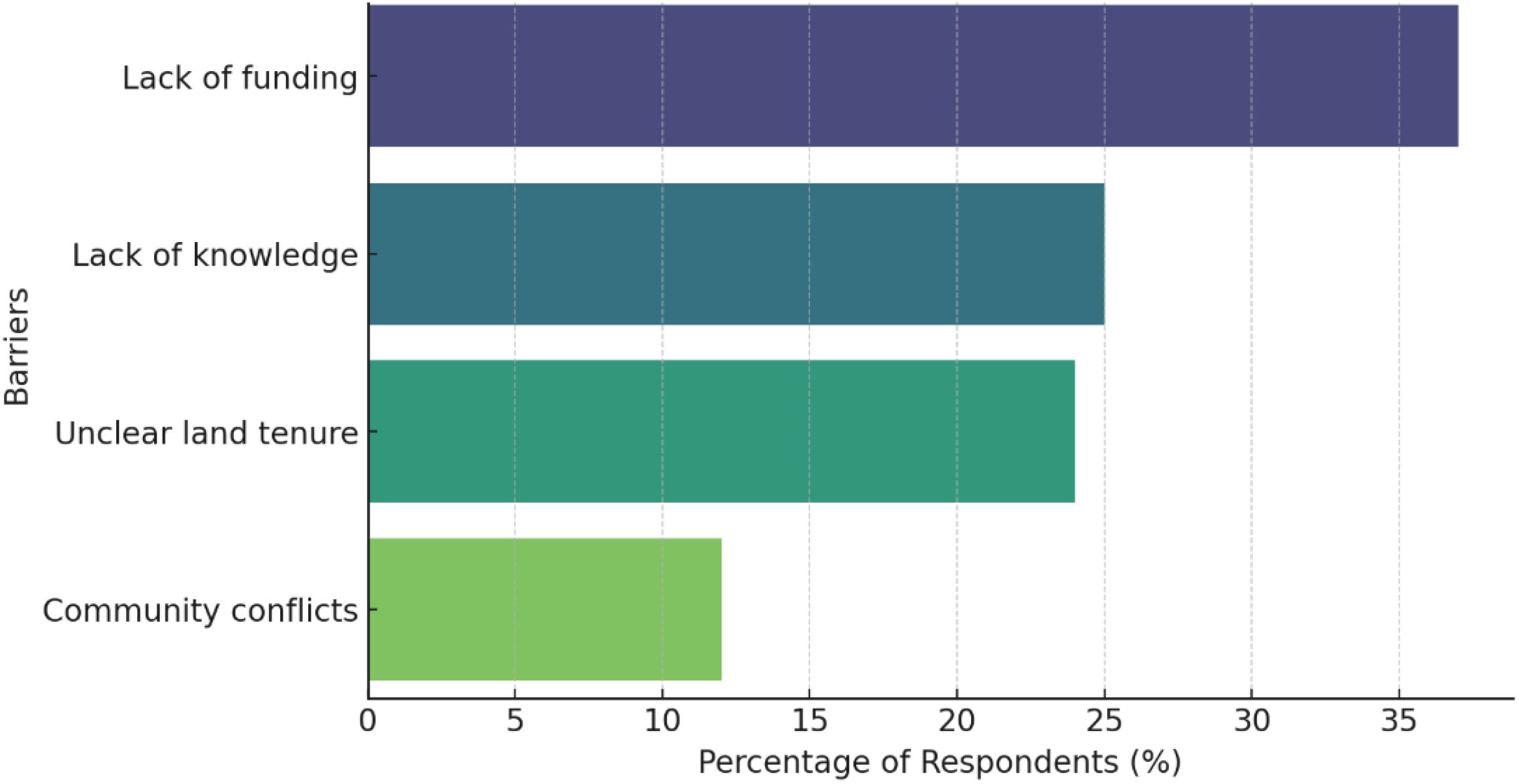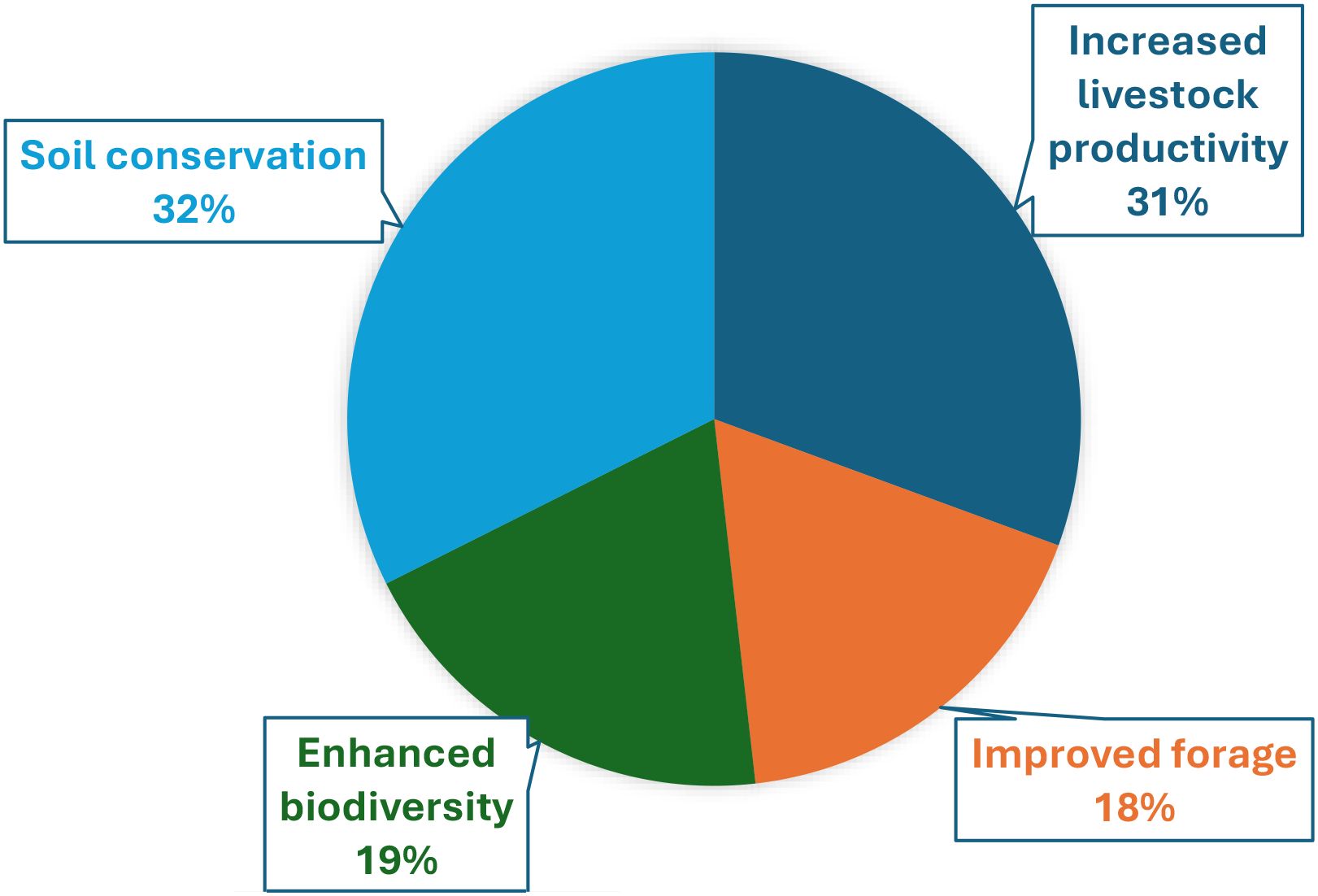- Centre for Global Change (CGC), University of Fort Hare, Dikeni, South Africa
Rangeland degradation continues to pose significant ecological and economic challenges for rural communities in the Eastern Cape, South Africa, adversely affecting livestock productivity and ecosystem services. This study investigates community perceptions, awareness, and willingness to engage in rangeland restoration efforts. A mixed−methods approach was used, combining a structured survey of 150 respondents and focus group discussions (FGDs). Quantitative data were analyzed using chi−square and logistic regression analyses, while qualitative data were thematically coded to explore local narratives and deepen understanding. The results reveal that 73% of respondents recognize rangeland degradation as a serious issue, with 85% acknowledging its adverse impacts on livestock productivity. Willingness to participate in restoration was influenced by education (p = 0.031), access to resources (p = 0.011), and technical knowledge (p = 0.012), highlighting the role of education, land tenure security, and institutional support. Focus groups added nuance, indicating varied perceptions of “degradation” and “restoration” across participants, and revealed constraints related to resource access, financial limitations, and the nature of restoration activities envisaged. These findings underscore the importance of aligning restoration interventions with local perceptions, clarifying the scope of restoration practices, and embedding them within inclusive institutional and governance arrangements. Sustainable restoration in communal rangelands will require context−specific strategies that balance ecological priorities with rural livelihood needs.
1 Introduction
Rangelands are vital ecosystems that support ecological functions such as biodiversity conservation, carbon sequestration, and water regulation, while also underpinning the livelihoods of millions of people globally (Letsoalo et al., 2025; Karimi and Saghaleini, 2021; Ndlovu and Moyo, 2023). In sub−Saharan Africa, and especially in South Africa, communal rangelands form the backbone of rural economies, providing grazing resources, fuelwood, and medicinal plants (Tokozwayo et al., 2025; Mdiya et al., 2021; Moloise et al., 2024). However, the sustainability of these landscapes is increasingly threatened by climate change, which affects pasture growth, alters species composition, and impacts animal behavior and productivity. Under shifting climate patterns, communal pastures experience irregular rainfall, extended dry seasons, rising temperatures, and increased woody species encroachment, reducing the quality and quantity of palatable grasses available for livestock grazing (Slayi et al., 2024a; Kong et al., 2014; Hosseininia et al., 2013). These dynamics affect animal behavior by limiting grazing times, altering dietary habits, and compromising reproduction and overall animal health, making rural communities more vulnerable to ecological and economic shocks (Bamwesigye et al 2024; Boronyak et al 2022; Nciizha and Wakindiki, 2012).
The degradation of communal rangelands in South Africa is compounded by socio−economic constraints such as overgrazing due to high stocking densities, the absence of structured rotational grazing practices, and weakened enforcement of traditional authority (Palmer et al., 2022; Ngorima and Shackleton, 2019; Rohde et al., 2006). These pressures, combined with land tenure insecurity and limited access to extension services, reduce the resilience of communal grazing lands and intensify rural poverty (Weaver et al., 2023; Yapi et al., 2023). In contrast, professionally managed farms often employ formal grazing and range management strategies, including balanced stocking densities, rotational grazing, and the use of climate−resilient forages, yielding higher productivity and ecological stability (Popoola et al., 2020, 2018). Conversely, communal lands tend to operate under traditional practices that rely on inherited knowledge and communal oversight, making them more susceptible to degradation when collective action falters (Finca et al., 2023; Bennett and Barrett, 2007). Understanding these differences is vital for designing restoration interventions that suit both communal and professionally managed farms.
Rangeland degradation has far−reaching ecological and socio−economic impacts, including reduced forage availability, declining pasture quality, increased greenhouse gas emissions, and diminished livestock productivity (Ndlovu and Moyo, 2023; Slayi et al., 2023a; Ullah et al., 2024). This environmental crisis undermines rural household income and intensifies vulnerability, making long−term sustainability an urgent priority (Yapi et al., 2024; Shackleton et al., 2020; Taylor et al., 2021). While restoration efforts such as reseeding degraded areas, rotational grazing, bush clearing, and erosion control have demonstrated potential benefits (Diogo et al., 2021; Bamwesigye et al., 2024; Hosseininia et al., 2013), the effectiveness of such interventions depends critically on aligning restoration efforts with local knowledge, institutional arrangements, and farmer perceptions. In the context of the Tyhume rural communities, restoration aims to restore degraded communal lands primarily for improved forage availability and enhanced livestock productivity, with long−term benefits extending to biodiversity recovery and ecological resilience.
Although communities often recognize the urgency of restoring degraded rangelands, translating this awareness into concrete action is challenging. Constraints such as limited financial resources, insufficient technical knowledge, and unclear or contested land−tenure arrangements hamper rural participation in restoration efforts (Yapi et al., 2023; Djenontin et al., 2018; Masterson et al., 2017). In the Tyhume area, communal lands dominate the landscape, making up approximately 85% of the area, with fragmented pockets of privately managed farms (15%) under formal range management practices. Understanding how communities perceive degradation and the constraints that shape their willingness to adopt restoration practices is vital for aligning interventions with local realities. This study aims to address these gaps by assessing (i) the level of awareness of rangeland degradation and restoration among rural communities in the Eastern Cape, (ii) the socio−demographic and institutional factors shaping this awareness, and (iii) the key constraints and motivations associated with participation in restoration efforts. The findings will contribute to a deeper understanding of how communal and professionally managed farms can collaborate to foster resilient and sustainable rangeland ecosystems, ensuring long−term ecological and economic benefits for rural communities.
2 Conceptual framework
This study employs an integrated socio-ecological framework, guided by the Theory of Planned Behaviour (TPB) (Ajzen, 1991) and Socio-Ecological Systems (SES) thinking (Ostrom, 2009), to explore the factors that drive community participation in rangeland restoration. The framework (Figure 1) illustrates the interaction between ecological conditions, individual perceptions, and institutional environments, which collectively shape behavioral intentions and actions towards restoration. At the ecological level, processes of degradation, such as overgrazing and woody species encroachment, have a direct impact on the productivity and functionality of communal rangelands. These environmental changes subsequently affect community awareness and perceptions of the severity of land degradation, which are crucial for motivating engagement in restoration practices. The community-level dimension highlights socio-demographic characteristics, including age, gender, education, livelihood dependence on livestock, and tenure arrangements. These factors not only influence how individuals perceive degradation but also affect their sense of agency, responsibility, and the benefits they associate with restoration.
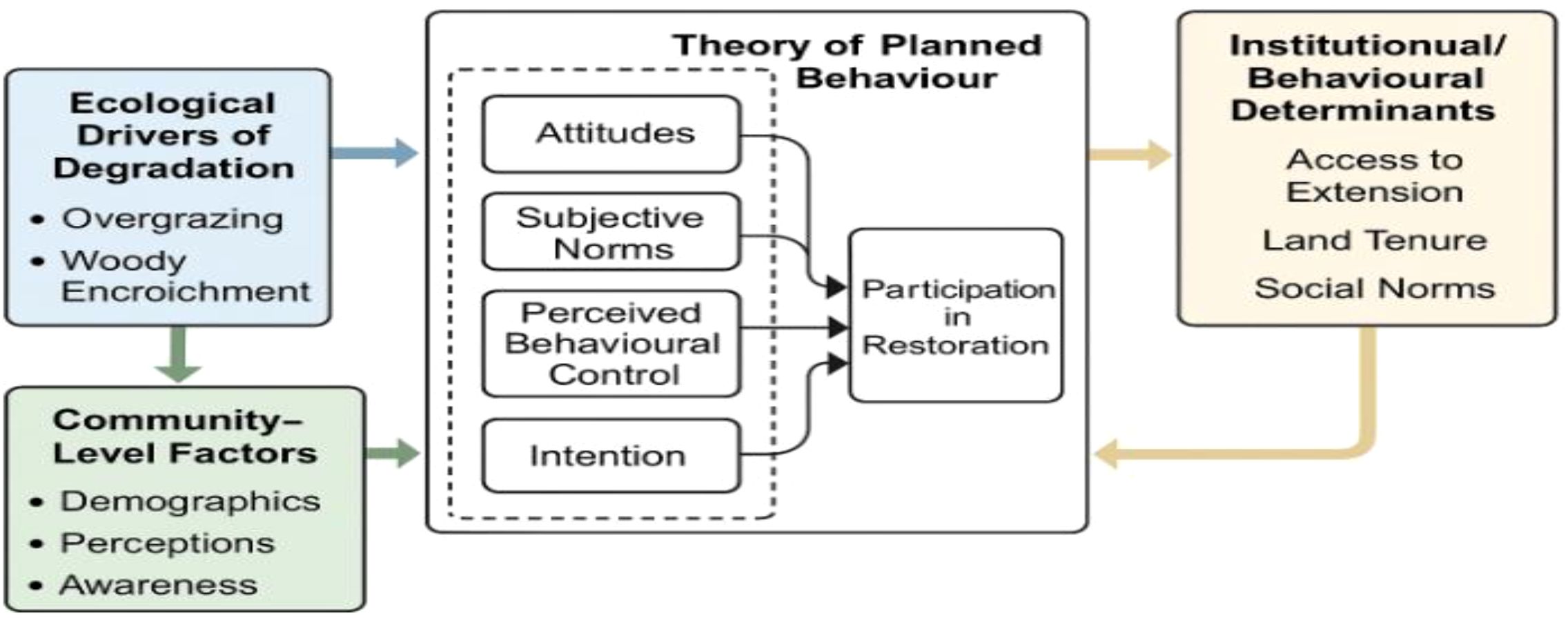
Figure 1. Socio-ecological framework for understanding community participation in rangeland restoration.
Central to the framework is the Theory of Planned Behaviour, which posits that individual attitudes (positive or negative evaluations of restoration), subjective norms (perceived social expectations), and perceived behavioral control (confidence in one’s ability to act) together predict intention, the closest predictor of actual behavior. This theory offers a structured perspective for examining the psychological readiness of community members to engage in restoration initiatives. The outer layer of the framework addresses institutional and behavioral determinants, such as access to extension services, land tenure security, and the presence of enabling social norms. These contextual factors play a vital role in shaping the three TPB constructs by either facilitating or constraining individual and collective action. Figure 1 demonstrates how these interconnected components function within a feedback loop: ecological degradation influences perceptions and awareness, which, together with institutional support, inform behavioral intentions and ultimately determine participation in rangeland restoration. This holistic approach is essential for designing locally appropriate, inclusive, and sustainable restoration strategies.
3 Materials and methods
3.1 Ethical considerations
Ethical clearance was granted by the University of Fort Hare Research Ethics Review Board (Ref: JAJ051SMPO01). Informed consent was obtained from all participants, ensuring that their participation was voluntary and that their anonymity and confidentiality were strictly maintained throughout the study.
3.2 Site description
The study was conducted in four rural communities, Krwakrwa, Ncerha, Majwarheni, and Kwezana, under the Amakhuze Tribal Authority within the Raymond Mhlaba Local Municipality of the Eastern Cape Province, South Africa (Figure 2). The area lies within the upper Keiskamma catchment, a region of ecological significance where communal rangelands serve as the primary resource for livestock grazing and rural livelihoods. Geographically, it is located between 32.65°S and 32.80°S latitude and 26.85°E and 27.00°E longitude, with elevations ranging from 800 m to 1,400 m above sea level. The climate is semi-arid to sub−humid, with annual rainfall between 400 and 700 mm, largely concentrated in the summer months (October–March), and periodic droughts intensifying forage shortages. Temperatures range from approximately 5 °C in winter to over 30 °C in summer, directly affecting vegetation dynamics. The area is dominated by mixed grassland and shrubland species, including Themeda triandra, Eragrostis curvula, and Vachelia karroo (Mucina and Rutherford, 2011; Acocks, 1988). However, the communal rangelands face increasing degradation caused by unsustainable grazing practices, soil erosion, woody species encroachment, and weakened land governance (Nciizha and Wakindiki, 2011).
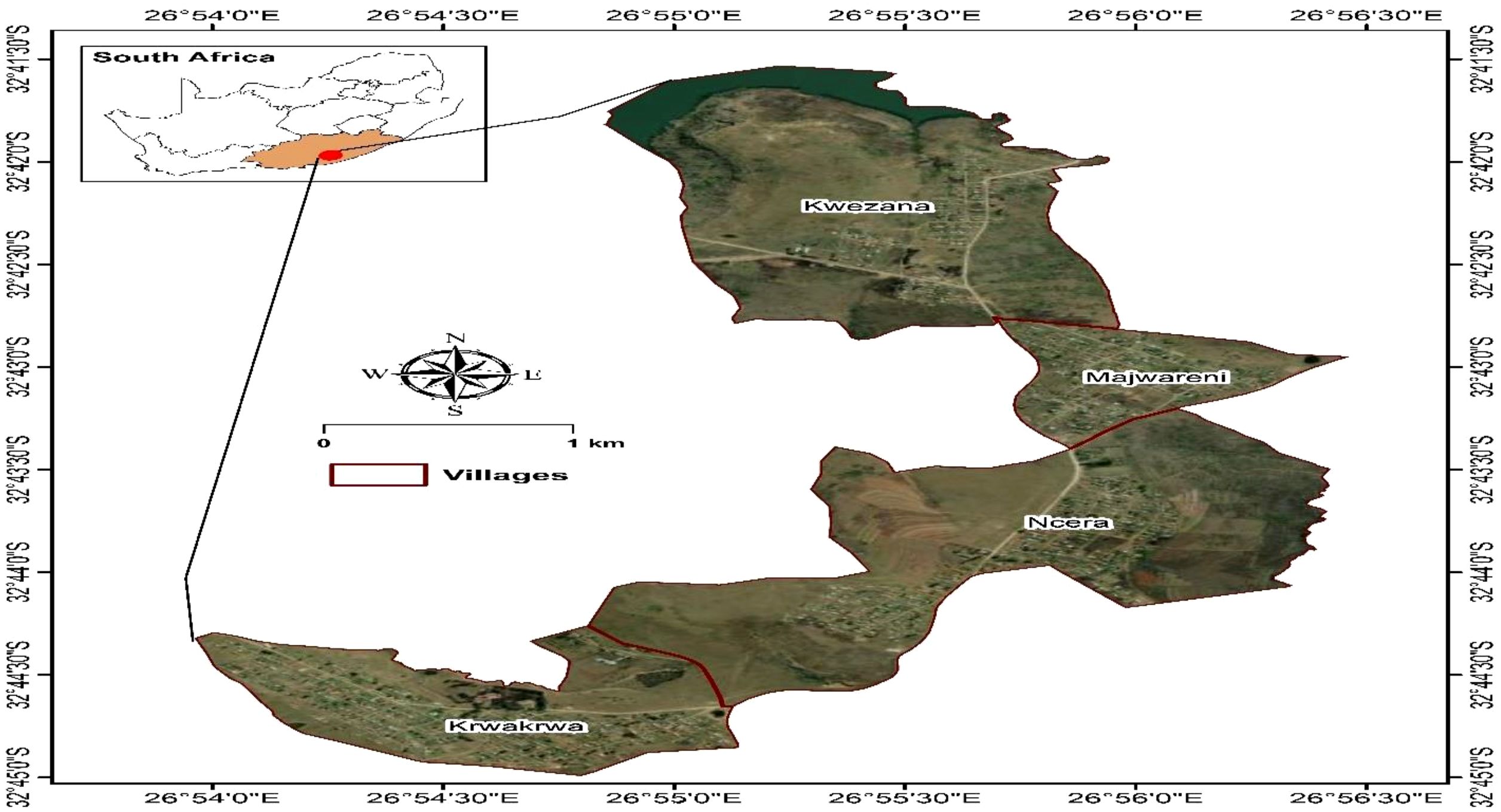
Figure 2. Presents a map of the study area with clearly marked survey villages and catchment boundaries.
3.3 Concept definitions and translations
Key terms such as degradation, restoration, sustainability, and biodiversity were defined, explained, and translated into isiXhosa in collaboration with local enumerators and leaders. The research team used participatory translation exercises and pre−testing to ensure respondents fully understood these concepts.
3.4 Research design and data collection
A convergent mixed-methods approach was adopted to capture both quantitative and qualitative perspectives on rangeland degradation, community awareness, and willingness to participate in restoration. Data collection took place over the late summer season (February to March 2024), a critical period for observing post-rainfall vegetation responses and grazing impacts.
3.4.1 Sampling procedure and participant selection
A multi-stage sampling technique was employed. First, four villages within the Tyhume area were purposively selected based on their proximity to communal rangelands and varying levels of perceived degradation. Within these villages, 150 households were randomly selected from village registers obtained from local authorities. Where registers were unavailable, systematic random sampling was applied by selecting every 3rd household along main footpaths. For Focus Group Discussions (FGDs), a purposive sampling approach was used to ensure diversity in age, gender, and livestock ownership. Community leaders assisted in recruiting participants for FGDs, using snowball sampling to identify experienced livestock keepers and elders knowledgeable about traditional rangeland practices.
3.4.2 Household surveys
Structured questionnaires were administered face-to-face in the local language. The instrument included four sections:
A. Demographic characteristics
B. Perceptions and awareness of degradation
C. Attitudes toward restoration
D. Institutional and governance-related factors
Each interview lasted 30–45 minutes. The questionnaire was pretested with 10 households from a neighboring village to refine clarity and translation. Revisions were made to ensure cultural sensitivity and comprehension.
3.4.3 Focus group discussions
A total of six FGDs were conducted, each involving 8–12 participants, including livestock keepers, youth, women, and community leaders. Discussions explored:
A. Local knowledge of degradation trends
B. Traditional and contemporary land-use practices
C. Barriers to and motivators for participation in restoration
Each session was audio-recorded (with consent), transcribed verbatim, and translated where necessary. Discussions lasted 60–90 minutes.
3.5 Data analysis
3.5.1 Quantitative analysis
Quantitative data were analyzed using R version 3.4.2 (R Core Team, 2017). Descriptive statistics (frequencies, means, and standard deviations) were used to summarize demographic characteristics and awareness levels. To explore determinants of community willingness to participate in rangeland restoration, a binary logistic regression model was used. The logistic regression model takes the form:
Where:
▪ P = probability of being willing to participate in restoration
▪ X1,X2,…,XkX_1, X_2,…, X_kX1,X2,…,Xk = independent variables (e.g., education level, age, access to extension, land tenure security)
▪ β0 = intercept
▪ βk = coefficients of predictors
Variables were selected based on theoretical relevance and previous studies (Diogo et al., 2021; Coppock et al., 2022; Slayi et al., 2024c). Multicollinearity was checked using Variance Inflation Factors (VIF), and model fit was assessed using the Hosmer-Lemeshow test.
3.5.2 Qualitative analysis
Transcripts from FGDs were coded and analyzed thematically using NVivo version 10 (Castleberry, 2014). Initial codes were derived from the interview guide and complemented by inductive themes emerging from the data. Coding was performed by two independent researchers to ensure reliability, and discrepancies were resolved through discussion. Triangulation of qualitative insights and quantitative findings provided a holistic understanding of community dynamics around rangeland restoration.
4 Results
4.1 Socio-demographic characteristics of respondents
Table 1 presents the socio−demographic characteristics of the 150 respondents. The sample comprised 56.5% males and 43.5% females, with no significant association between gender and participation in rangeland restoration (χ² = 2.13, p = 0.144). The largest proportion of respondents (61.2%) were aged between 31 and 50 years, followed by those aged 18–30 years (28.2%) and those older than 50 years (20.6%), although the differences across age groups were not statistically significant (χ² = 5.23, p = 0.073). Education level was a significant determinant of participation (χ² = 8.94, p = 0.031): 35.3% of respondents had no formal education, 56.5% had primary education, 32.9% had secondary education, and 37.6% had attained tertiary education. This suggests that higher education levels are associated with increased awareness and engagement in restoration efforts. Livestock ownership was evenly distributed across the sample (50%), and it was not a significant determinant of participation (χ² = 0.76, p = 0.382).
4.2 Community awareness and perceptions of rangeland degradation
As shown in Table 2, 73% of respondents acknowledged rangeland degradation as a serious issue, while 12% remained neutral, and 15% disagreed. This result was statistically significant (χ² = 7.82, p = 0.045), indicating strong consensus about the problem. An overwhelming 85% agreed that degradation negatively affects livestock productivity, with only 4% disagreeing, yielding a significant result (χ² = 9.42, p = 0.021). Similarly, 89% of respondents supported the idea that restoration is vital for sustainability (χ² = 10.35, p = 0.018), underscoring widespread awareness of its ecological and economic benefits.
4.3 Willingness to participate in rangeland restoration
Table 3 shows that access to resources (χ² = 6.45, p = 0.011) and technical knowledge (χ² = 6.28, p = 0.012) were both significant factors influencing willingness to participate in rangeland restoration. Seventy−seven percent of respondents with better access to resources and 70% of those with technical knowledge expressed willingness to participate. Land tenure security, although only marginally significant (χ² = 3.81, p = 0.057), suggests that the stability of land rights may also play an important role in shaping participation. These findings point to the critical role of resource availability and technical training in promoting sustainable restoration practices.
4.4 Insights from focus group discussions
The focus group discussions revealed deeply rooted perceptions and priorities that shaped the community’s understanding and engagement with rangeland restoration. As shown in Table 4, participants emphasized their lived experience of degradation, recalling a time when hills were covered with grass, contrasting sharply with the present state of bare soils and thorn trees. This reflects an acute awareness of how overgrazing and woody encroachment have impacted the land. Importantly, gender emerged as a central theme, with participants highlighting the vital role women play in managing cattle and making household decisions, reinforcing the need for gender-inclusive restoration efforts. Restoration was broadly framed as a means of revitalizing the land to support better forage availability and long-term sustainability. However, financial constraints and limited access to tools, fencing, and training were identified as significant barriers, underscoring the necessity of resource provision and technical support. Education and extension services were also emphasized, with participants expressing a strong desire to understand the causes and consequences of degradation to foster communal learning and action. Moreover, perceptions of land tenure security surfaced as pivotal, with participants linking a sense of ownership and autonomy to their willingness to invest in restoration activities.
4.5 Barriers to rangeland restoration participation
Figure 3 illustrates the key barriers to rangeland restoration as perceived by respondents. The most significant challenge is the lack of funding, with over 35% of respondents identifying it as a major obstacle. This suggests that financial constraints hinder the implementation of restoration projects, including investments in infrastructure, training, and resource management. The second most cited barrier is the lack of knowledge, reported by approximately 25% of respondents, indicating that insufficient awareness and technical expertise limit the adoption of effective restoration practices. Similarly, unclear land tenure is identified by nearly the same percentage of respondents, highlighting the complexities surrounding land ownership and management rights, which can discourage long-term investment in restoration efforts. Lastly, community conflicts, though less frequently mentioned (around 15%), still represent a notable challenge, reflecting social tensions and competing land-use priorities that can impede collaborative restoration initiatives.
4.6 Expected benefits of rangeland restoration
Figure 4 illustrates the expected benefits of rangeland restoration, with soil conservation emerging as the most significant outcome, accounting for 32% of the total benefits. This highlights the crucial role of restoration efforts in preventing soil erosion, improving water retention, and maintaining soil fertility, all of which are essential for sustaining rangeland ecosystems. Closely following, increased livestock productivity represents 31% of the benefits, emphasizing how improved soil conditions and vegetation cover contribute to better forage availability, enhanced animal health, and higher yields in meat and milk production. Enhanced biodiversity, making up 19% of the expected benefits, underscores the role of restoration in promoting ecological balance, facilitating the regeneration of native plant species, and supporting wildlife diversity, which strengthens overall ecosystem resilience. Lastly, improved forage accounts for 18% of the total benefits, indicating that restoration interventions, such as reseeding and rotational grazing, play a key role in enhancing the quantity and quality of grazing materials for livestock.
4.7 Factors influencing willingness to participate in rangeland restoration
Table 5 revealed that education level (β = 0.85, p = 0.003), land tenure security (β = 1.42, p = 0.017), household income (β = 0.78, p = 0.018), access to extension services (β = 1.15, p = 0.016), and perceived benefits of restoration (β = 0.92, p = 0.001) significantly influenced willingness to participate. These factors positively increased the odds of participation, with land tenure security having the strongest influence (Odds Ratio = 4.14). Conversely, a lack of financial resources had a negative impact (β = -0.73, p = 0.037), reducing the likelihood of participation (Odds Ratio = 0.48). The negative coefficient for financial resources underscores the need for economic incentives or subsidies to encourage broader engagement in rangeland restoration efforts.
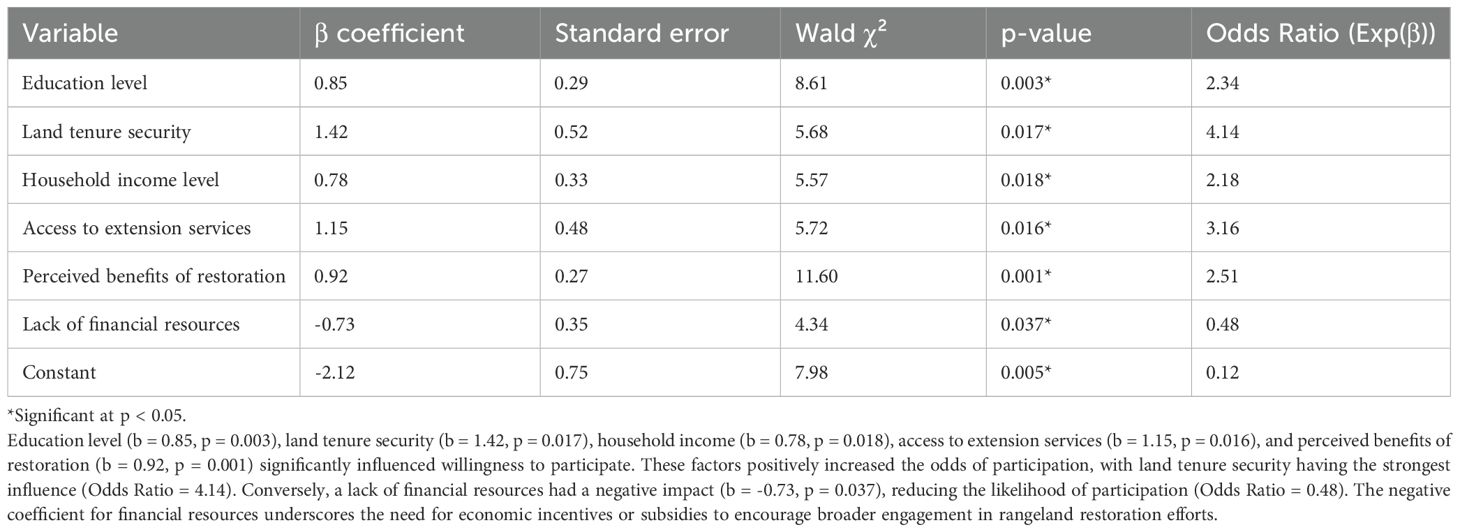
Table 5. Binary logistic regression results for factors influencing willingness to participate in rangeland restoration activities.
5 Discussion
This study provides valuable insights into the socio−demographic determinants, perceptions, and willingness of rural Eastern Cape communities to engage in rangeland restoration. The findings confirm and expand upon existing research on community−based natural resource management, highlighting the interplay between local socio−economic contexts, institutional environments, and perceptions of environmental benefits (Gusha et al., 2024; Letsoalo et al., 2025). Notably, gender was not a significant statistical determinant of willingness to participate (p = 0.144). Although earlier studies suggested that men dominate land−management decisions (Palmer et al., 2022; Kimiti et al., 2017), focus group narratives revealed a more nuanced picture. Women play pivotal roles in livestock care, forage collection, and household resource allocation, making their inclusion vital for effective restoration. These qualitative findings underscore the critical role of gender−inclusive strategies and highlight that restoration efforts must move beyond statistical analyses to foster equitable participation across gender lines.
Education emerged as a significant predictor of participation (p = 0.031), aligning with prior studies that link formal education with heightened environmental awareness and a propensity to adopt sustainable land−management practices (Slayi et al., 2023a; Coppock et al., 2022). Focus group discussions further revealed that participants with higher levels of education were more confident in describing the drivers of land degradation, including overgrazing, woody encroachment, and soil erosion, and identifying potential benefits associated with restoration. These findings suggest that targeted educational and awareness programs can help bridge knowledge gaps across demographics, aligning perceptions with long−term ecological and economic benefits. Importantly, qualitative data revealed that participants viewed the causes of degradation as multi−layered, extending beyond environmental pressures to encompass socio−cultural shifts, traditional grazing practices, and institutional constraints, a finding that supports observations by Dalziel and Evans (2025); Slayi et al., (2024b); Zerihun et al., (2014).
While 73% of survey respondents identified rangeland degradation as a serious issue and 85% acknowledged its impacts on livestock productivity, focus group discussions added depth to these statistics by exposing varied interpretations of what “degradation” entails and why it occurs. These narratives revealed that the perceptions of degradation are highly context−dependent, shaped by communal traditions, climate variability, and weakened institutional structures. Similarly, although 89% of survey participants expressed support for restoration, qualitative data revealed that the concept of “restoration” itself was contested. Whereas some participants associated it with external, expert−driven interventions, others framed it within traditional knowledge and communal heritage. This suggests that future restoration efforts must clearly define restoration objectives, whether aimed at increasing forage availability, restoring biodiversity, or achieving a balance between the two, and embed these objectives within a participatory, culturally relevant framework.
Structural constraints emerged as significant barriers across both the survey and focus group data. Statistical analyses confirmed that access to resources (p = 0.011) and technical knowledge (p = 0.012) were strong predictors of participation, aligning with prior studies (Slayi et al., 2023b; Djenontin et al., 2018). Yet qualitative narratives emphasized the human dimension behind these statistics, highlighting instances where rural communities expressed a willingness to adopt sustainable practices but lacked the necessary support, training, and incentives. The data reveal that economic constraints often compel short−term decision−making over long−term ecological planning, a trend also noted by Kimiti et al. (2017). The role of institutional and financial interventions, such as Payment for Ecosystem Services (PES), input grants, and microfinance schemes, emerged as vital in bridging this gap between intention and action.
Although land tenure security was only marginally significant in the survey data (p = 0.057), focus group narratives emphasized its symbolic and practical significance for long−term resource stewardship. This finding suggests that, while statistical measures capture broad patterns, qualitative data reveal the deeper complexities of how land rights and perceptions of belonging shape restoration dynamics. The qualitative evidence, in line with Diogo et al. (2021) and Slayi et al. (2024d), highlights the importance of aligning formal land rights with institutional support, creating an environment that encourages long−term investment in restoration. Taken together, these findings point to a multi−faceted approach that goes beyond technical prescriptions, placing rural communities at the heart of restoration planning, implementation, and benefit−sharing. By addressing structural barriers, integrating local knowledge, and aligning ecological interventions with socio−economic incentives, future restoration efforts can foster resilient communal rangelands and secure long−term benefits for rural communities in the Eastern Cape.
6 Conclusion
This study highlights how socio−demographic characteristics, perceptions, and institutional constraints shape community participation in rangeland restoration in the Eastern Cape. Historically, communal rangelands have been vital to rural livelihoods, but long−term degradation caused by overgrazing, woody encroachment, and climate variability has weakened both ecological resilience and rural economic stability. Currently, although communities recognize the ecological and economic impacts of this degradation, their willingness and ability to participate in restoration efforts are shaped by a range of factors, including education, land tenure security, financial resources, and access to extension services. Future restoration efforts must be rooted in a multi−faceted approach that clearly defines restoration objectives, whether aimed at increasing forage availability, restoring biodiversity, or achieving both, and ensures that these priorities align with local knowledge, traditions, and priorities. Education and training can deepen environmental awareness and foster a stronger sense of stewardship, while targeted financial support, such as subsidies, payments for ecosystem services (PES), and microfinance, can reduce economic constraints that hamper participation. Importantly, involving farmers and local stakeholders in the design, implementation, and management of these financial and institutional mechanisms will help to build trust, create equitable benefit−sharing arrangements, and foster long−term commitment. Future research should focus on exploring participatory governance and community−led restoration models that balance ecological and economic priorities, clarifying the nature and objectives of restoration activities and assessing how these efforts evolve within different land−tenure settings. Such approaches have the potential to create an enduring foundation for sustaining communal rangelands, preserving their productivity, and safeguarding their role in rural life for generations to come.
Data availability statement
The raw data supporting the conclusions of this article will be made available by the authors, without undue reservation.
Ethics statement
Ethical review and approval was not required for the study on human participants in accordance with the local legislation and institutional requirements. The participants [OR participants legal guardian/next of kin] provided their written informed consent to participate in this study.
Author contributions
MS: Investigation, Methodology, Writing – review & editing, Formal analysis, Writing – original draft, Conceptualization.
Funding
The author(s) declare that financial support was received for the research and/or publication of this article. The author acknowledges the financial support received from the National Research Foundation, grant number TS64 (UID: 99787).
Acknowledgments
The author is grateful to colleagues from the Centre for Global Change (CGC) and Department of Livestock and Pasture Science at the University of Fort Hare for assisting in giving constructive feedback in developing the manuscript.
Conflict of interest
The authors declares that the research was conducted in the absence of any commercial or financial relationships that could be construed as a potential conflict of interest.
Generative AI statement
The author(s) declare that no Generative AI was used in the creation of this manuscript.
Publisher’s note
All claims expressed in this article are solely those of the authors and do not necessarily represent those of their affiliated organizations, or those of the publisher, the editors and the reviewers. Any product that may be evaluated in this article, or claim that may be made by its manufacturer, is not guaranteed or endorsed by the publisher.
References
Acocks J. P. H. (1988). “Veld types of South Africa,” in Memoirs of the Botanical Survey of South Africa, 3rd ed (Government Printer, Pretoria), 1–146.
Ajzen I. (1991). The theory of planned behavior. Organizational Behav. Hum. Decision Processes 50, 179–211. doi: 10.1016/0749-5978(91)90020-T
Bamwesigye D., Yeboah E., Ozbalci S., Fialova J., Kupec P., Verter N., et al. (2024). Climate change and potential of agroforestry in Uganda: youth perceptions and willingness to participate in adaptation and transition efforts. Forests 15, 2108. doi: 10.3390/f15122108
Bennett J. and Barrett H. (2007). Rangeland as a common property resource: contrasting insights from communal areas of central Eastern Cape Province, South Africa. Hum. Ecol. 35, 97–112. doi: 10.1007/s10745-006-9062-9
Boronyak L., Jacobs B., Wallach A., McManus J., Stone S., Stevenson S., et al. (2022). Pathways towards coexistence with large carnivores in production systems. Agric. Hum. Values 39, 47–64. doi: 10.1007/s10460-021-10224-y
Castleberry A. (2014). NVivo 10 [software program. Am. J. Pharm. Educ. 78, 1–3. doi: 10.5688/ajpe78125
Coppock D. L., Crowley L., Durham S. L., Groves D., Jamison J. C., Karlan D., et al. (2022). Community-based rangeland management in Namibia improves resource governance but not environmental and economic outcomes. Commun. Earth Environ. 3, 32. doi: 10.1038/s43247-022-00361-5
Dalziel A. and Evans M. (2025). Community perceptions and socio-economic implications of conservation corridors and networks in the Vhembe District, Limpopo, South Africa. Ambio 54, 338–349. doi: 10.1007/s13280-024-02073-w
Diogo R. V. C., Dossa L. H., Vanvanhossou S. F. U., Abdoulaye B. D., Dosseh K. H., Houinato M., et al. (2021). Farmers’ and herders’ perceptions on rangeland management in two agroecological zones of Benin. Land 10, 425. doi: 10.3390/land10040425
Djenontin I. N. S., Foli S., and Zulu L. C. (2018). Revisiting the factors shaping outcomes for forest and landscape restoration in Sub-Saharan Africa: A way forward for policy, practice and research. Sustainability 10, 906. doi: 10.3390/su10040906
Finca A., Linnane S., Slinger J., Getty D., Samuels M. I., and Timpong-Jones E. C. (2023). Implications of the breakdown in the indigenous knowledge system for rangeland management and policy: a case study from the Eastern Cape in South Africa. Afr. J. Range Forage Sci. 40, 47–61. doi: 10.2989/10220119.2022.2138973
Gusha B., Gwapedza D., Khinkwayo A., Phooko D., Dakie R. N., Palmer A. R., et al. (2024). Exploring rangeland integrity to support ecosystem-based livelihoods in the Eastern Cape. doi: 10.13140/RG.2.2.26856.07688
Hosseininia G., Azadi H., Zarafshani K., Samari D., and Witlox F. (2013). Sustainable rangeland management: Pastoralists' attitudes toward integrated programs in Iran. J. Arid Environments 92, 26–33. doi: 10.1016/j.jaridenv.2013.01.003
Karimi S. and Saghaleini A. (2021). Factors influencing ranchers’ intentions to conserve rangelands through an extended theory of planned behavior. Global Ecol. Conserv. 26, e01513. doi: 10.1016/j.gecco.2021.e01513
Kimiti D. W., Hodge A. M. C., Herrick J. E., Beh A. W., and Abbott L. E. (2017). Rehabilitation of community-owned, mixed-use rangelands: lessons from the Ewaso ecosystem in Kenya. Plant Ecol. 218, 23–37. doi: 10.1007/s11258-016-0691-9
Kong T. M., Austin D. E., Kellner K., and Orr B. J. (2014). The interplay of knowledge, attitude and practice of livestock farmers' land management against desertification in the South African Kalahari. J. arid Environments 105, 12–21. doi: 10.1016/j.jaridenv.2014.02.002
Letsoalo N. L., Samuels I. M., Tjelele J. T., Ntombela K. P., Clement C. F., Foster J., et al. (2025). Understanding the attributes and knowledge to achieve sustainable farming in South African rangelands: Learning from “champion” livestock farmers.
Masterson V., Tengö M., and Spierenburg M. (2017). Competing place meanings in complex landscapes: a social–ecological approach to unpacking community conservation outcomes on the Wild Coast, South Africa. Soc. Natural Resour. 30, 1442–1457. doi: 10.1080/08941920.2017.1347975
Mdiya L., Taruvinga A., Mushunje A., Mopipi K., and Ngarava S. (2021). Rural community use and perception of rangeland products in Eastern Cape Province, South Africa. Afr. J. Science Technology Innovation Dev. 13, 757–768. doi: 10.1080/20421338.2020.1798043
Moloise S. D., Matamanda A. R., and Bhanye J. I. (2024). Traditional ecological knowledge and practices for ecosystem conservation and management: the case of savanna ecosystem services in Limpopo, South Africa. Int. J. Sustain. Dev. World Ecol. 31, 29–42. doi: 10.1080/13504509.2023.2249856
Mucina L. and Rutherford M. C. (2011). The Vegetation of South Africa, Lesotho and Swaziland (Pretoria: SANBI), 513.
Nciizha A. D. and Wakindiki I. I. C. (2012). Particulate organic matter, soil texture and mineralogy relations in some Eastern Cape ecotopes in South Africa. South Afr. J. Plant Soil 29, 39–46. doi: 10.1080/02571862.2012.688882
Ndlovu T. and Moyo P. (2023). “Drought Adaptation Practices and Rangeland Management in Rural Umzingwane, Zimbabwe: Implications for Climate Justice,” in Climate Action in Southern Africa (Routledge: Taylor and Francis), 33–50.
Ngorima A. and Shackleton C. M. (2019). Livelihood benefits and costs from an invasive alien tree (Acacia dealbata) to rural communities in the Eastern Cape, South Africa. J. Environ. Manage. 229, 158–165. doi: 10.1016/j.jenvman.2018.05.077
Ostrom E. (2009). A general framework for analyzing sustainability of social-ecological systems. Science 325, 419–422. doi: 10.1126/science.1172133
Palmer C. G., Fry A., Libala N., Ralekhetla M., Mtati N., Weaver M., et al. (2022). Engaging society and building participatory governance in a rural landscape restoration context. Anthropocene 37, 100320. doi: 10.1016/j.ancene.2022.100320
Popoola O. O., Monde N., and Yusuf S. F. G. (2018). Perceptions of climate change impacts and adaptation measures used by crop smallholder farmers in Amathole district municipality, Eastern Cape province, South Africa. GeoJournal 83, 1205–1221. doi: 10.1007/s10708-017-9829-0
Popoola O. O., Yusuf S. F. G., and Monde N. (2020). Information sources and constraints to climate change adaptation amongst smallholder farmers in Amathole District Municipality, Eastern Cape Province, South Africa. Sustainability 12, 5846. doi: 10.3390/su12145846
R Core Team (2017). R: A Language and Environment for Statistical Computing (Vienna, Austria: R Foundation for Statistical Computing). Available online at: https://www.R-project.org/.
Rohde R. F., Moleele N. M., Mphale M., Allsopp N., Chanda R., Hoffman M. T., et al. (2006). Dynamics of grazing policy and practice: environmental and social impacts in three communal areas of southern Africa. Environ. Sci. Policy 9, 302–316. doi: 10.1016/j.envsci.2005.11.009
Shackleton R. T., Novoa A., Shackleton C. M., and Kull C. A. (2020). “The social dimensions of biological invasions in South Africa,” in Biological Invasions in South Africa (Springer International Publishing, Cham), 701–729.
Slayi M., Zhou L., Dzvene A. R., and Mpanyaro Z. (2024b). Drivers and consequences of land degradation on livestock productivity in Sub-Saharan Africa: A systematic literature review. Land 13, 1402. doi: 10.3390/land13091402
Slayi M., Zhou L., and Jaja I. F. (2023a). Exploring farmers’ perceptions and willingness to tackle drought-related issues in small-holder cattle production systems: a case of rural communities in the eastern cape, South Africa. Appl. Sci. 13, 7524. doi: 10.3390/app13137524
Slayi M., Zhou L., and Jaja I. F. (2023b). Constraints inhibiting farmers’ adoption of cattle feedlots as a climate-smart practice in rural communities of the eastern cape, South Africa: An In-Depth Examination. Sustainability 15, 14813. doi: 10.3390/su152014813
Slayi M., Zhou L., Nyambo P., Jaja I. F., and Muchaku S. (2024d). Communally established cattle feedlots as a sustainable livelihood option for climate change resilience and food security in sub-Saharan Africa: a systematic review. Front. Sustain. Food Syst. 7, 1325233. doi: 10.3389/fsufs.2023.1325233
Slayi M., Zhou L., and Thamaga K. H. (2024c). Land degradation in Southern Africa: restoration strategies, grazing management, and livelihoods. Agriculture 14, 1849. doi: 10.3390/agriculture14101849
Slayi M., Zhou L., Thamaga K. H., and Nyambo P. (2024a). The role of social inclusion in restoring communal rangelands in Southern Africa: A systematic review of approaches, challenges, and outcomes. Land 13, 1521. doi: 10.3390/land13091521
Taylor A., Wynants M., Munishi L., Kelly C., Mtei K., Mkilema F., et al. (2021). Building climate change adaptation and resilience through soil organic carbon restoration in Sub-Saharan rural communities: challenges and opportunities. Sustainability 13, 10966. doi: 10.3390/su131910966
Tokozwayo S., Gulwa U., Sogoni A., Royimani L., Matshawule S., Mthi S., et al. (2025). Exploring socioeconomic status of communal farmers in Emalahleni Local Municipality in the Eastern Cape, South Africa.
Ullah A., Adams F., and Bavorova M. (2024). Empowering young farmers' voices in climate change extension programs: An in-depth analysis of decision-making dynamics and social media engagement. Int. J. Disaster Risk Reduction 111, 104713. doi: 10.1016/j.ijdrr.2024.104713
Weaver M. J. T., Cockburn J., Mtati N., and Palmer C. G. (2023). Exploring transformative processes at the intersections of land, water and livelihoods: a case study from the Tsitsa Project, South Africa. Ecosyst. People 19, 2278307. doi: 10.1080/26395916.2023.2278307
Yapi T. S., Shackleton C. M., and Le Maitre D. C. (2024). Identifying opportunities and constraints to effective management of invasive Australian wattle (Acacia) species in grassland landscapes, South Africa. Ecol. Soc. 29, 1–14. doi: 10.5751/ES-15429-290401
Yapi T. S., Shackleton C. M., Le Maitre D. C., and Dziba L. E. (2023). Local peoples’ knowledge and perceptions of Australian wattle (Acacia) species invasion, ecosystem services and disservices in grassland landscapes, South Africa. Ecosyst. People 19, 2177495. doi: 10.1080/26395916.2023.2177495
Keywords: rangeland degradation, community engagement, climate change, livestock production, extension services
Citation: Slayi M (2025) Community perspectives and participation in rangeland restoration: challenges and opportunities in the Eastern Cape, South Africa. Front. Anim. Sci. 6:1606434. doi: 10.3389/fanim.2025.1606434
Received: 05 April 2025; Accepted: 01 July 2025;
Published: 16 July 2025.
Edited by:
Iain James Gordon, Australian National University, AustraliaReviewed by:
Akash Jamil, Cholistan University of Veterinary and Animal Sciences, PakistanHalil Ibrahim Erkovan, Eskisehir Osmangazi Universitesi, Türkiye
Copyright © 2025 Slayi. This is an open-access article distributed under the terms of the Creative Commons Attribution License (CC BY). The use, distribution or reproduction in other forums is permitted, provided the original author(s) and the copyright owner(s) are credited and that the original publication in this journal is cited, in accordance with accepted academic practice. No use, distribution or reproduction is permitted which does not comply with these terms.
*Correspondence: Mhlangabezi Slayi, bXNsYXlpQHVmaC5hYy56YQ==
 Mhlangabezi Slayi
Mhlangabezi Slayi